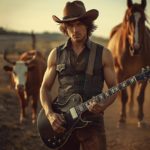Liverpool is a port city, and therefore has its own specifics: if you don’t work at the docks, you work on a ship. If you don’t work here or there, then you’re dying. Ronald Wycherly worked here and there. He began learning the piano at preschool age, and at the age of 14 he acquired his first guitar. Having access to the latest news from American ships, he heard about rock and roll before many of his peers. It wasn’t the slightest bit difficult to assemble his own gang in the midst of the skiffle pandemic, but it turned out to be a much more difficult task to teach his colleagues how to play more or less acceptably, which is why young Ronald had to work hard, writing his own music.

Success, and this was natural for its time, crept up overnight: Wycherly managed to get into the concert hall where Marty Wilde was supposed to perform. Ronald was going to sell a couple of his songs to Marty, but manager Larry Parnes, who had eaten more than one kosher dog in the field of show business, decided to immediately introduce the novice Ron Wycherly to the public. Ron showed everyone his “Elvis”, that is, he performed certain swings to his own accompaniment. The success was overwhelming. Larry, who knew a lot about stage names, immediately came up with the name Billy Fury for Ronald. Much more deadly than Ronald Wycherly, right?

The first single, “Maybe Tomorrow”, although not innovative in harmony, has a special oceanic magic in the arrangement. The second side was “Gonna Type A Letter”, filled with laughing saxophone parts in the spirit of Gaidai comedies. The debut, released on the Decca major label in January 1959, reached number 18 in the UK charts. It should be noted that in that memorable year in the English charts such American legends as Buddy Holly, Fats Domino, Bobby Darin (Elvis – by default) competed for the championship.

The fact that islanders Marty Wilde and Cliff Richard competed with them already gives the islanders a certain status, even within the island. Throughout the year, Fury has been recording not only teen ballads, but also uncompromising rockabilly action films that match the fierceness of overseas buffoonery. “Turn My Back On You” alone is worth something.

At the same time as driving along a rutted track, Billy Fury is looking for a special sound, even without letting go of the steering wheel. For the first time, he approaches magic with the song “Wonderful Place”, and the apotheosis is “Don’t Jump”, an absolutely macabre canvas that remains quite a rockabilly song.


Meanwhile, Billy’s accompanying line-ups feel like their testicles are growing: Georgie Fame And The Blue Flames were formed from guys who decided that their shirts were too small. The Tornados will record with Fury the first live album in the history of English rock, “We Want Billy,” but they won’t be with him for long. At some point, some of The Silver Beetles tried out for the role of a companion band, but the manager’s demand to drive the crooked-armed bassist to hell caused rejection from the band’s leader John Lennon.

In 1965, the melodrama “I’ve Got a Horse” was released, starring Billy Fury and a horse. Larry Parnes decided to repeat the success of Elvis’s summer comedies, which in themselves did not shine with subtleties, and the playwright came out of Parnes even better. The name of the movie alone spoke volumes.

Nevertheless, Fury’s popularity began to decline a little later, he remained afloat for some time after the Beatles occupied a dominant role in the British rock scene. In 1973, Billy starred in the movie That’ll Be The Day, along with his Liverpool neighbor Ringo Starr and The Who drummer Keith Moon. In 1976, he underwent his second open heart surgery. Two years later, he was forced to declare bankruptcy. Five years later, Billy Fury was gone. All we have left are his magnificent recordings…













